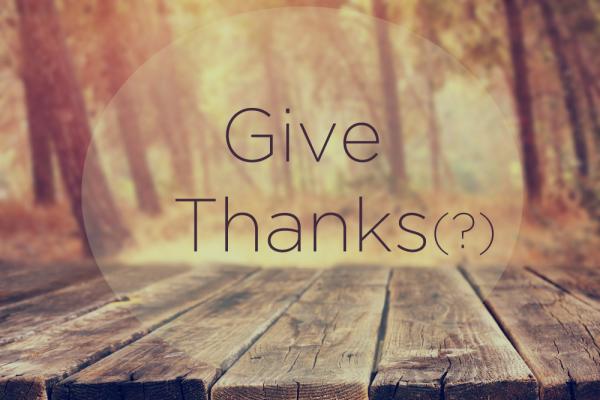Are you feeling pressure to be thankful?
We are in the midst of the Thanksgiving season. I’m reminded everywhere I go to “Be thankful!”
Well, call me the Scrooge of Thanksgiving, but I’m just not feeling thankful. The more someone tells me to “Be thankful!” the more I feel a sense of despair.
Be thankful? In the midst of Ferguson, Mo.? Jim Wallis writes that, “Many black families woke up this morning knowing that the lives of their children are worth less than the lives of white children in America.” And what will white America do about it? Nothing new. One side will continue the status quo of racism by denying that it even exists and then they will blame the victims. I firmly stand in the other side that blames America’s deeply embedded structures of racism, economic injustice, and educational inequality. To make matters worse, America is sharply divided over the shooting in Ferguson. Each side of the division blames the other for tragic violence. Sunday’s heated debate on Meet the Press between former New York Mayor Rudy Giuliani and Georgetown Professor Michael Eric Dyson is indicative of the deep racial tensions underlying not only Ferguson, but every city in the United States.
My Facebook news feed and the media are telling me how I’m supposed to feel about Ferguson. Outraged. Hurt. Anxious. Guilt. Anger. Bitter. But certainly not thankful.
A Theology of Despair
I’m feeling despair more than any other emotion. Why despair? Because each side believes they are right and the other is to blame. I feel despair because we humans have been addicted to the blame game from the very beginning. My therapist has encouraged me to have a “bird’s eye view” of current events in order to see the bigger picture.
Let me tell you, that view isn’t helpful.
When I take that view, I see the human propensity to blame and scapegoat others. Who’s to blame? White people? Black people? The police? The politicians? We see this scapegoating dynamic happening in Ferguson, but we also see it in family systems. I have friends who dread Thanksgiving because of their broken family system that inevitably alleviates tensions by finding a scapegoat.
My therapist has also encouraged me to look for God in these situations. Where is God? We tend to think that God is all-powerful. That’s a dangerous theology that legitimates power. And you know what they say about power – it corrupts. An all-powerful god is a corrupt god that we use for our own corrupt purposes.
Thankfully, the true God isn’t a God of power, but a God of nonviolent love who meets us where we are. God doesn’t force us to be thankful in times of grief and despair. Rather, God meets us in our honest and raw emotions.
A theology of despair claims that God meets us in our grief and hopelessness. God meets us as we walk through the valley of the shadow of death. There is evil in the world, but we don’t need to fear it because God is with us in the despair. Even Jesus, whom Christians will soon proclaim as “Emanuel,” or God is with us, despaired on the cross when he cried, “My God, my God, why have you forsaken me?”
Was that a thankful cry? No. But it was an honest cry of despair. And God met Jesus in that despair, for his next words were, “Into your hands I commend my spirit.”
And I’m left feeling despair. Why do we forsake one another in an endless cycle of blame? We know how to end that cycle. We know how to offer ourselves to one another in the spirit of nonviolent love and forgiveness.
Ending the cycle of blame is the hope for our future. But will we stop that cycle and replace it with sacrificial love and forgiveness?
As I take a bird’s eye view and look into the pit of despair, I have my doubts. The ultimate prophetic warning that Christianity has to offer is that if we keep scapegoating one another, we will destroy ourselves in apocalyptic violence to which the only alternative is nonviolent love and forgiveness.
Rene Girard put that prophetic warning best in his book Battling to the End, “Saying that chaos is near is not incompatible with hope, quite to the contrary. However, hope has to be seen in relation to an alternative that leaves only the choice between total destruction and the realization of the Kingdom” (119).
The realization of the Kingdom of God will only happen when we stop blaming one another. It will only happen when we realize that God loves all people, whether we think they deserve it or not. And it will only happen when we begin to take responsibility to love our neighbors as we love ourselves.
This Thanksgiving, I’m thankful that God is not a god of power and might. I’m thankful that the one true God is a God who meets us in our despair, who empowers us to stop scapegoating, and who is loving us with reckless abandon.
Adam Ericksen blogs at the Raven Foundation, where he uses mimetic theory to provide social commentary on religion, politics, and pop culture. Follow Adam on Twitter @adamericksen.
Background image; tomertu / Shutterstock.com
Got something to say about what you're reading? We value your feedback!
